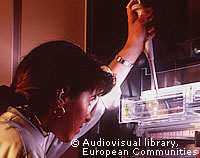Commission to invest six million euro in countering antibiotic resistance
The European Commission has announced its intention to support two research projects on anti-bacterial resistance with six million euro. The two projects, due to begin in early 2004, will investigate the rise of resistance to ß-lactum antibiotics in hospital and community-spread infections, and the basic molecular mechanisms of resistance, particularly with regard to Streptococcus pneumoniae, the major cause of pneumonia, septicaemia and meningitis. Highlighting the phenomenon of increased bacterial resistance to antibiotics, EU Research Commissioner Philippe Busquin said: 'People trust antibiotics to cure almost any kind of disease. Unfortunately, as recent outbreaks of Severe Acute Respiratory Syndrome [SARS] show, this is not the case.' The use of antibiotics has increased significantly since they first became available during the Second World War. A recent Eurobarometer survey showed that 38 per cent of EU citizens had taken antibiotics in the last 12 months. Statistics do however vary from country to country: the figure for France and Spain was 45 per cent, but only 22 per cent for Denmark. The Commissioner also emphasised the need to reverse the decline in research in this field by pharmaceutical companies. Many have pulled out from investments because expected sales revenues are no longer sufficient to make up for costs linked to the development of these drugs. Over the last four years, the EU has already invested more than 100 million euro in more than 80 research projects in the field. 'We will keep up the fight to find innovative answers to this problem,' said Mr Busquin.



